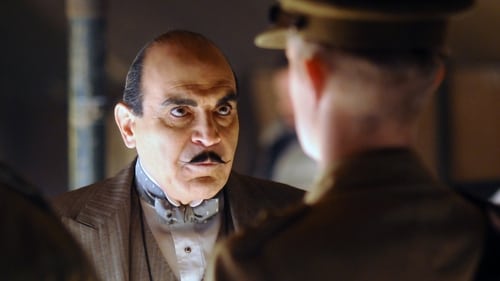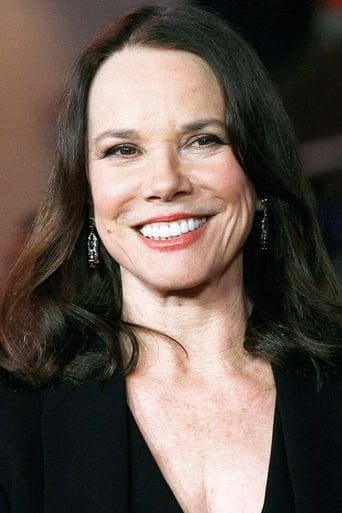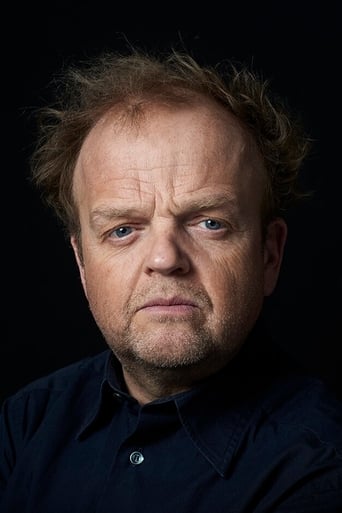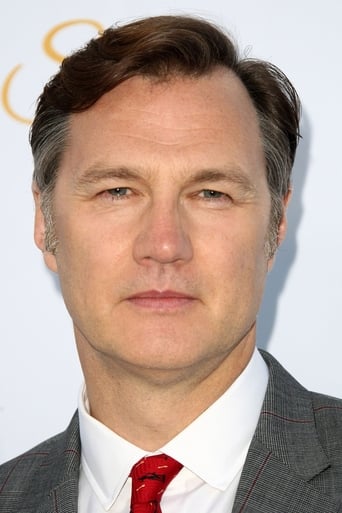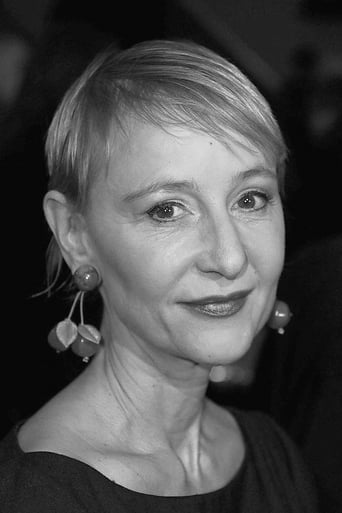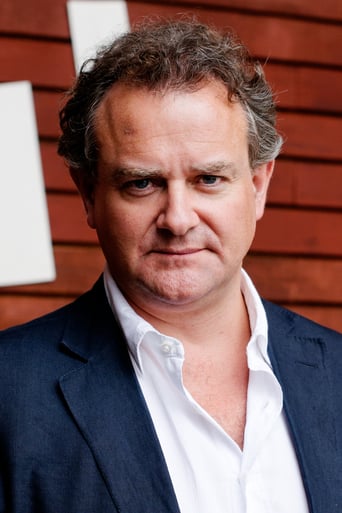LouHomey
From my favorite movies..
Claysaba
Excellent, Without a doubt!!
Tedfoldol
everything you have heard about this movie is true.
AutCuddly
Great movie! If you want to be entertained and have a few good laughs, see this movie. The music is also very good,
SimonJack
By the time that this film was made of Agatha Christie's "Murder on the Orient Express," David Suchet had played the role of Hercule Poirot for more than two decades. In that time, he had delved into and dissected the character that Christie created. Suchet had played Poirot in dozens of films from Christie stories. He had studied Poirot's appearance, his manners and mannerisms, his speech and his carriage. Suchet had probed the depth of the character. And, he fine-tuned his arrogant behavior with subtle, small changes as he, and the character, matured in the role over the years. Audiences knew Hercule Poirot only as Suchet now presented him. It was now 3½ decades since the original defining "Orient Express" of 1974. Albert Finney in the lead role and more than a dozen big name screen stars of the day had presented a masterpiece on film. But in between, a 2001 modernized version of the story was made for TV and aired on CBS. To say that that version was forgettable would be the kindest thing one could say about it. So, with movie rights in hand, ITV took another look at Christie's story. The writers returned to the original story and considered the darker overtones of the novel. They made one change in the plot toward the end that added an aspect of intrigue. And this time, they looked more deeply into Poirot's character, which, by now, had become so familiar to many millions of people through the British TV series and many individual films. Christie wrote a background for her 1934 mystery based on a real event. In March 1932, a kidnapper took the one-year old baby boy of the Charles Lindbergh's from their home in New Jersey. Two months later, the boy's body was found in the woods not far from the home. This movie is set in 1938, as war loomed in Europe, so the fictional kidnapping and killing in the story would have been in 1933. By 2010, the millions of viewers and fans of the previous two decades would be very much aware of Hercule Poirot's strong views on types of crimes. He vehemently disapproved of murder. No one could ever be justified in killing another human being in cold blood. Poirot believed strongly in justice under the law. And, with this new film, viewers get a further look into Poirot. He cannot tolerate revenge that leads to vigilante justice. This differs from the book though, where Poirot was a little empathetic toward those who wanted to right a miscarriage of justice. The producers did many things to capture the time of the story. The train cars were rebuilt to resemble those of the 1930s, down to the decorations, art works and frills. The costumes, dress, makeup and grooming condiments were authentic for the period. Much research went into the planning of this new film. The script, direction and acting meticulously followed the manners, mannerisms and customs of the time.
The 1974 film was true to the book and met with Christie's approval. Yet it didn't explore the dark side of murder as deeply as does this 2010 film. In this film, the script and cast play it just slightly more somberly. And Greta Ohlssen iterates how the avengers justify their form of vigilante justice. It's when God has not seen that justice was done. The contrast with Poirot and his serious moral convictions (when he prays the rosary), is striking. Poirot's strong abhorrence for anyone killing another person remains. This film is every bit as good as the 1974 movie. Each has its own appeal, with a slightly different approach. The preferred roles of the casts vary between the films. Suchet's Poirot is slightly better than Finney's. But most of the rest of the cast in the 1974 film outshine the performances of the 2010 film. Richard Widmark's Rathchett is much better than that of Toby Jones who seems to be overacting at times. Sean Connery's Col Arbuthnot is much better than David Morrisey's role. And, Ingrid Bergman is for superior to Marie Croz at Greta Ohlsson.
ma-cortes
The film gets marvelous interpretations , lush costume design and adequate production design along with glimmer photography . The movie is an excellent whodunit and this version of the story takes place in 1938 , concerning about one murder on the Orient Express train with Hercules Poirot , David Suchet , as the intelligent sleuth-man to solve it . There Hercule meets various passengers and Ratchett , Toby Jones , an American executive , traveling with his valet and male secretary , and he attempts to secure Poirot's services as he fears that his life is in danger . When the murder of the abrasive American businessman occurs on the train he's travelling on , celebrated detective Hercule Poirot is then recruited to solve the case . Shortly after , the Orient Express is blocked by a blizzard in Croatia . There are many suspects , all support cast : David Morrissey , Susanne Lothar ,Barbara Hershey , Hugh Bonneville , Steven Weaver , Jessica Chastain ... As usual , the final scenes, Poirot shares his solution of the case. In the picture there is mystery , emotion , suspense , twists , actors's interpretations are wonderful and including snowy outdoors . At the beginning of the film talks about a kidnapping and killing a baby similarly to the Lindberg's son and which the murderer was condemned to death row , this one will be related with the death of the train . In fact , Agatha Christie's story , being published in 1934 , was inspired by the notorious kidnapping, and subsequent murder, of famous aviator Charles A. Lindbergh and Anne Morrow Lindbergh's baby, Charles Lindbergh Jr. in 1932 . The pace is deliberate , slow and relaxed . And while the dialogue is in English, the film has a deliciously international flavor , with a mix of interesting accents and word pronunciations . The motion picture is only set on two scenarios : the station and train . However this doesn't make boring it . The support cast is pretty good , formed mostly by British and American actors , such as : Jessica Chastian , David Morrissey , Toby Jones , Stanley Wever , Samuel West , Joseph Mawle , Serge Hazanavicious , Marie-Josée Croze and special mention for Eileen Atkins as the veteran as well as bittered Princess Dragomiroff and Hugh Bonneville who portrays a trusted valet of a wealthy gentleman . The set design and costumes are riveting , the flick is magnificently set by that time . Evocative and suspenseful musical score by Christian Henson . Alan Almond's cinematography is atmospheric and colorful ; being shot at Pinewood Studios in Buckinghamshire, where the design team built a believable replica of an Orient Express carriage . This Hercule Poirot episode was efficiently directed by Philip Martin .The TV movie will appeal to suspense enthusiasts and thriller lovers.
There are several adaptation based on this known novel by Agatha Christie : Murder on the Orient Express (2001) by Carl Schenkel with Alfred Molina as Hercule Poirot , Meredith Baxter , Leslie Caron , Adam James , Dylan Smith , Tasha de Vasconcelos , Amira Casar and Peter Strauss . And the outstanding rendition was Murder on the Orient Express (1974) by Sidney Lumet Sean Connery , Anthony Perkins , Vanessa Redgrave , Jacqueline Bisset , Richard Widmark , Rachel Roberts , John Gielgud , Michael York and Ingrid Bergman's Oscar-winning performance . And finally Murder on the Orient Express (2017) starred and directed by Kenneth Branagh with Johnny Depp , Josh Gad , Derek Jacobi , Adam Garcia , Judi Dench , Penelope Cruz , Olivia Colman and Daisy Riley .
aramis-112-804880
Agatha Christie was the greatest exemplar of the mystery story because of her range. She wrote stories where the most obvious suspect did it, where the narrator did it, where no one did it, and where everyone did it! And "Murder on the Orient Express" ranks right up with "The Murder of Roger Ackroyd" as one of her most famous yarns, both because the book is well known and because of the famous 1974 movie version.My first exposure to Agatha Christie as an innocent schoolboy was the gala all-star 1974 "Murder on the Orient Express." Though I never became a Christie aficionado until nearly twenty years later, I have enjoyed that version immensely then, and upon repeated viewings.I was wary of David Suchet's version. While alterations are necessary as stories shift from a literary to a visual medium, some longer "Poirot" episodes made unnecessary changes and their mood was frightfully dark. Better "long" Poirot episodes include "Peril at End House"; "Sad Cypress"; "Third Girl" (changed, but an improvement over the book); and "The Clocks." Meanwhile, among the more egregious misfires are "Appointment with Death"; the, admittedly, difficult "Murder of Roger Ackroyd"; and the simply boring "Murder on the Blue Train."I tried to divorce myself from the earlier flick while enjoying this "Poirot" but I fear echoes of the past kept sounding in my mind. I don't have this sort of trouble with "Hamlet"; but with "Poirot" I kept missing the humor and joie de vivre of the earlier version even amidst the murder, and the panache it showed from casting to costuming to the jaunty score. And I really miss Jacqueline Bisset!My fault, I know. If you haven't seen the earlier version, or think Albert Finney's 1974 vision of Poirot was an affront to Christie (I know people who hated Finney who accepted the buffoonish Peter Ustinov!) then you might enjoy this more realistic retelling of Christie's most famous story.
tedg
Lawrence Olivier was an actor who delivered rewards, but acting is not storytelling and sometimes the opposite is the case. He made a well regarded Hamlet and approached it as expected; he inhabited the character and let *that* being drive what was presented. If only he understood the confounding dynamic structure the author erected to allow us to have at each instant several beings inhabiting that soul. The beauty of the play is in how their layers, folds and governance stay always ahead of our ability to cleanly see the world's edges.Suchet has similar power over the detective he has played now for some time. He has inhabited the character and extended him far beyond what the author envisioned. Some of it is quite impressive and affords the intensity Suchet (or any actor) desires. But it fights the structure Christie mastered. It is a matter of personal discovery for me that I crave both Christie and Shakespeare. The former is about abstract purity, logical clarity where emotion is color only. Shakespeare uses urge as his primary quality, where urges can be spiky or smoky, weaving and stinking. He conveys reason without logic, sense without cleanliness.Christie's villains are simply wicked. The story is a matter of presenting logical impossibilities and having our detective sort them so that they are physically possible. These are logic puzzles. The characters have emotions, color and even motive as a second order. Her attention was all in the form; she could have no suspect be the murderer, or all. The narrator could be, or the murdered themselves. The more physically impossible, and the more unlikely the solution, the better. Like Holmes, Poirot would be far more interested in resolution than justice. Most editions of this story have a diagram of the coach, showing who could see what and where anyone could move. Facts as they appeared and were reshaped were all done so in this physical context. The Sidney Lumet 1974 version preserved all this while adding enough color to satisfy viewers who did not want to engage with the story, helping to sort the pieces.This version has none of that detective folding, where we work with the detective. The impossibilities of the murder are largely omitted. The culpability of the porter is necessary here but ignored. On the other hand, we have three fine locomotives. I don't know where they got that remarkable train, but it would be a great addition to any competent story.And of course we have Suchet, who seems to be far ahead of all the other production assets in defining what the story is and what it is about. I am not a fan of the notion that each character has/is one primary urge and the bumping of these urges is what drama is about. No, that doesn't work for me. But it is interesting to see the control he has, dragging all else behind to suit.The big surprise for me: Jessica Chastain! What a presence, something between Cate Blanchett and Julianne Moore and every bit as powerful. Suchet could take lessons; power is in what you give away to make your world work. A Two: has some interesting elements.
